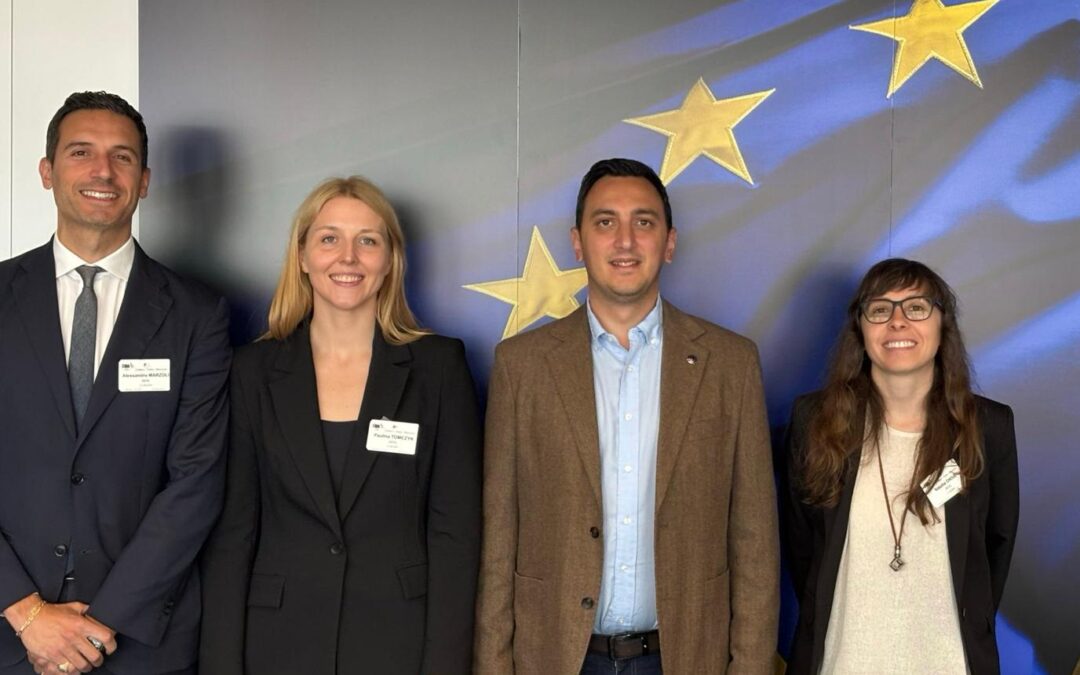
Jul 2, 2025
Last week, representatives of the European Athletes and Players Association (EAPA) were in Brussels for a visit that included a meeting with Commissioner Glenn Micallef, the European Commissioner for Intergenerational Fairness, Youth, Culture and Sport.
Led by EAPA President Natalia Orive Siviter, General Secretary Paulina Tomczyk, and EAPA Executive Board Member Alessandro Marzoli, EAPA were in Belgium to bring the voice of athlete and player associations into key discussions through workshops facilitated by the SOPROS project which aims to assess, evaluate, and implement athletes’ social protection in Olympic sports.
The meeting with Commissioner Micallef took place on the second day of the visit to Belgium and marked a significant step forward in recognising athletes not only as performers, but as young citizens with rights, responsibilities, and a rightful place in shaping the systems that govern them.
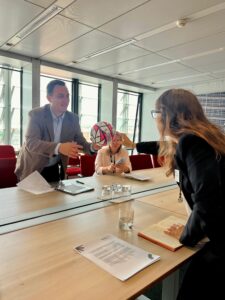
In a focused discussion, EAPA highlighted the real-world challenges many athletes face and which are often obscured by Olympic medals and headlines. The delegation shared concrete examples from their work, drawing attention to critical gaps in maternity protection and mental health support.
Commissioner Micallef reassured the delegation that the protection of athletes’ rights is a key part of his mandate, and the welfare of all athletes will remain central to his work. He emphasised that sport must reflect the same values that Europe upholds in society, and made it clear that athletes deserve greater freedom, voice, and agency in shaping their futures.
The importance of social dialogue in achieving these goals emerged as a central theme. Discussions underscored the urgent need to strengthen athlete representation across all Olympic sports and to establish formal mechanisms that enable athletes to engage meaningfully with employers, federations, and public authorities.
The engagement with the Commissioner coincided with EAPA’s continued participation with the SOPROS project. The workshop convened high-level representatives from the European Commission (including Sport, Social Security, and Social Dialogue Units), the European Parliament, the Council of Europe, the EU Presidency trio (Poland, Denmark, Cyprus), European federations, and academic and policy experts.
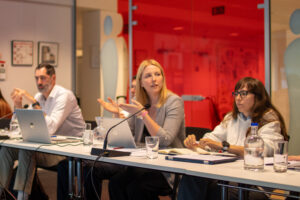
credit: European Olympic Academies
Rooted in the findings of the Erasmus+ EMPLOYS project, SOPROS addresses the ongoing reality that many Olympic athletes lack consistent or enforceable social protections. From inadequate healthcare coverage to unclear pension entitlements and ad-hoc maternity support, the gaps are both significant and systemic.
At EAPA, we understand that policy change alone isn’t enough. Representation matters. Athlete and player associations are essential to turning policy into protection. Our meeting with Commissioner Micallef affirmed that the European Commission not only recognises this truth, but is ready to support it.
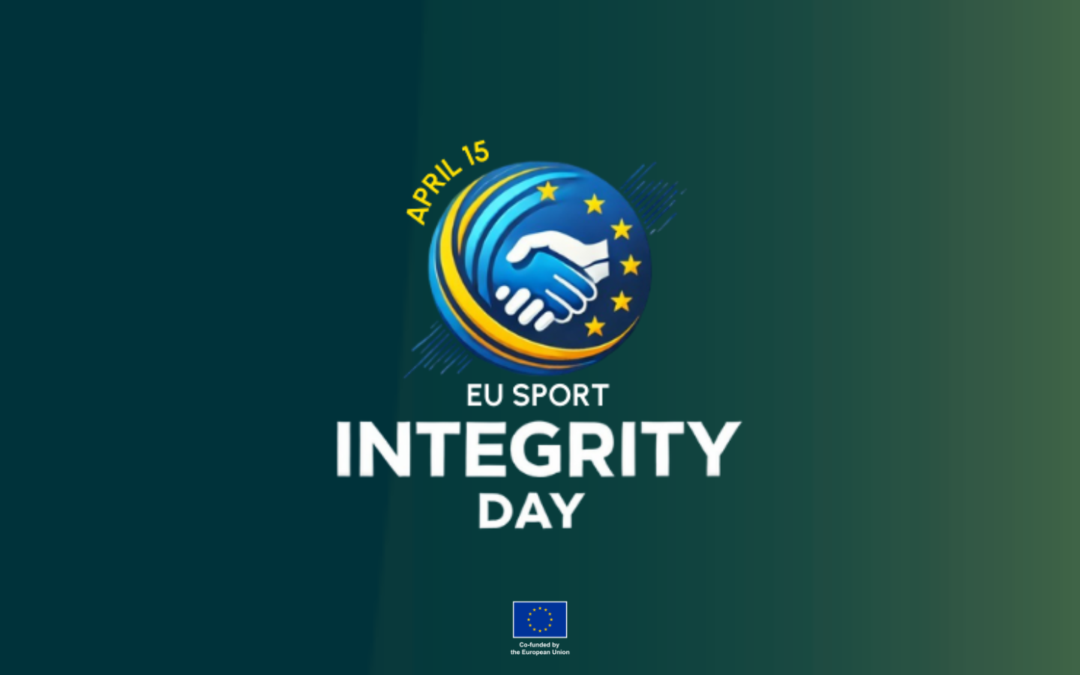
Apr 11, 2025
Every year the 15th of April marks #EUSportIntegrityDay. First launched by the European Athletes and Players Association (formerly EU Athletes) in 2014, EU Sport Integrity Day gives key stakeholders in sport across Europe the opportunity to speak out against match-fixing and reaffirm their commitment to safeguarding the integrity of sport. Over the years the campaign has grown with strong support from player associations, sport federations, public bodies and organisations.
The consequences of match-fixing for athletes can be devastating, affecting their reputations and potentially jeopardising their careers. Athlete and player associations remain actively engaged in educating athletes on combating competition manipulation, empowering them to identify fixers and report any suspicious activities.
In early 2025, we proudly announced our involvement in PROtect Integrity Responsibly, a new EU-funded Erasmus+ project. PROtect Integrity Responsibly is a continuation of over a decade of successful work from the Association in its fight against match-fixing and corruption in sport by focusing on promoting integrity in sport through the education of athletes about responsible gambling practices and their role in preventing competition manipulation.
In collaboration with player associations across Europe, EAPA aims to reach over 5,500 elite athletes and professionals. The project will combine both online and face-to-face education on responsible gambling and competition integrity.
Together with our partners, we are ensuring that the fight for clean, fair, and responsible sport continues to gain momentum.
Join us in safeguarding our sports and take a stand against match-fixing every year on #EUSportIntegrityDay.
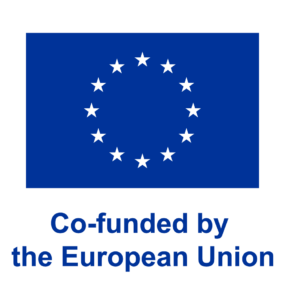

Mar 10, 2025
Earlier this year we were delighted to kick off our latest ERASMUS+ project: Athletes for Good governance and Rights in EuropE (AGREE). Coordinated by EAPA, our first meeting was held in Madrid earlier this year.
The AGREE project promotes the integrity and values in sport, focusing on improving good governance in sport. The aim of the project is to promote the sport governance by enhancing the relevant knowledge and developing competences related to collective bargaining.
The topic of collective bargaining was identified as one of the key areas where more work was needed during EAPA’s General Assembly 2023. Furthermore, the importance was earlier highlighted in the EU Athletes Common Position Paper (2022).
The project will start with research into collective bargaining in sport, as well as exploring the connections between Collective Bargaining Agreements, Good Governance and Athlete Rights. Based on this research, the CBA Report and the Final Report shall be published.
Thereafter 16 job shadowing visits will be organised. Through these visits, partners will be able to develop their knowledge and competencies related to collective bargaining. Furthermore, seven national events involving key stakeholders shall be organised.
Based on the results obtained from the research and the input and experiences from the visits and events, the project will place a focus on preparing European minimum standards and practical guidelines. This will lead to the publication of the following papers: the Minimum Standard European Contract, the Minimum Standard European CBA and the Practical Guide on Collective Bargaining Agreements.
Lastly, the project shall ensure that the activities and all the obtained results are widely shared via specific campaigns and social media.
The project consortium is composed of 10 members, EAPA, the Edge Hill University as the research institution, and eight player associations:
ABP – Spanish Basketball Players Association
AJFSF – Spanish Women’s Futsal Players Association
HSF – Danish Handball Players Association
GIBA – Italian Basketball Players Association
GPA – Gaelic Player Association
JPY – The Football Players Association of Finland
NL Sporter – Dutch Athletes Association
Provale – French Rugby Player Association
For further information regarding the project, please contact: info@euathletes.org


Feb 11, 2025
The European Athletes and Players Association (EAPA) is proud to announce the successful conclusion of PROtect Integrity Online – an Erasmus+ project co-funded by the European Union. The two-year initiative has been dedicated to promoting integrity and combating match-fixing in sport. Through extensive research, development, and implementation, the PROtect Integrity Online has provided thousands of professional athletes across Europe with integrity education using online tools and methods.
Over the past 15 years, EAPA and its project partners have been at the forefront of tackling match-fixing through education. Athlete and player associations play a crucial role in safeguarding the integrity of sport, leveraging their close relationships with athletes to deliver impactful learning experiences. The PROtect Integrity Online project has reinforced this commitment by equipping players with the knowledge to anticipate and resist corruption and manipulation.
Key Achievements of PROtect Integrity Online:
- Extensive Education Outreach: Eight player associations delivered in-person integrity education to 7,533 athletes across 591 team visits.
- Innovative Learning Materials: Development of engaging educational resources, including a revised Code of Conduct, animated videos, and interactive tools to enhance learning.
- Research and Recommendations: Comprehensive reports mapping the landscape of match-fixing education and providing strategic recommendations for future efforts.
As a direct follow-up to this success, EAPA has now launched PROtect Integrity Responsibly, a new initiative building on the best practices and lessons learned. This next phase aims to further refine integrity education strategies, ensuring that athletes continue to receive the highest quality support in recognizing and resisting match-fixing threats.
Why Match-Fixing Education Matters Match-fixing remains a significant challenge in professional sports, with athletes often being the primary targets of manipulation. Without proper education, players may find themselves vulnerable to criminal influence, risking their careers and the credibility of their sport. The PROtect Integrity Online project has demonstrated that systematic, engaging, and well-structured education is key to empowering athletes and protecting the game.
Next Steps and Resources The legacy of PROtect Integrity Online continues through the freely available educational materials developed during the project, including:
With the launch of PROtect Integrity Responsibly in January 2025, EAPA and its partners reaffirm their commitment to strengthening sport integrity across Europe. By learning from past successes and continuously evolving educational approaches, the fight against match-fixing remains at the heart of our mission.
For further information on our initiatives and access to educational resources, please visit: www.protect-integrity.com
Our thanks to our project partners:
AJSF (men’s futsal, Spain), AJFSF (women’s futsal, Spain), RPI (rugby union, Ireland), HSF (handball, Denmark), GIBA (basketball, Italy), AIP (volleyball, Italy), SNB (basketball, France), AJPH (handball, France), University of Rennes 2 (research institution)
This project has been co-funded by the European Union. The content reflects only the authors’ views, and the European Commission is not responsible for any use that may be made of the information contained therein.

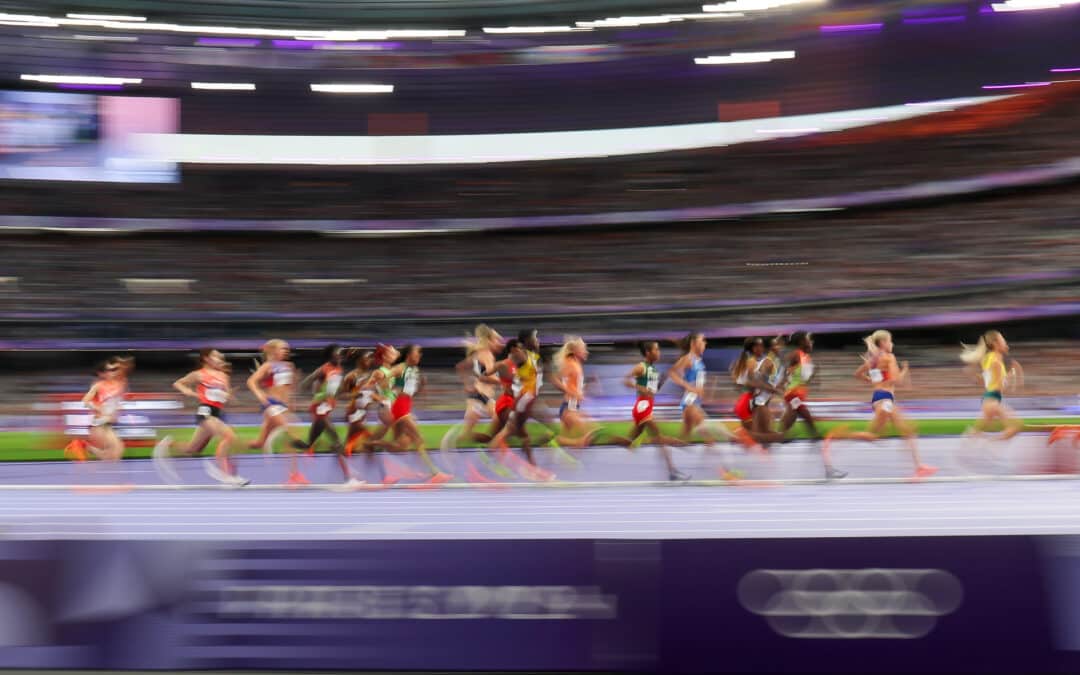
Jan 23, 2025
UNI World Players, a sector of UNI Global Union, has carried out the first-ever public poll to assess awareness and attitudes regarding athletes’ rights and representation at the Olympic Games. The poll of nearly 3,200 people from Australia, France and the United States was conducted by Ipsos, a leading global market research firm, in the months following the 2024 Paris Olympics. It shows immense public support for greater compensation for Olympic athletes and increased athlete input in decisions affecting their careers.
The poll underscores that IOC’s actions are out of step with public expectations on athlete rights and representation, highlighting the public’s lack of awareness of the challenges Olympic athletes face. As seven candidates battle it out to become the new President of the IOC, to be decided in March this year, UNI World Players is seeking a commitment to fair treatment for athletes and their fair share of the billions of dollars generated at the Games.
Among the poll’s key findings:
Overwhelming support for fair pay for Olympians
- Across the three countries surveyed, half of respondents admitted they “did not know” whether the IOC shares revenue generated at the Games as a form of payment (directly or indirectly) with athletes. Only 18% correctly recognized that the IOC does not.
- A majority (65%) believe the IOC should share Olympic revenue as a form of payment with athletes (either directly or indirectly). Support is highest in Australia (68%), followed by France (67%) and the United States (59%).
Strong backing for greater athlete agency, including sponsorships
- The overwhelming majority of respondents (73%) were unaware that athletes at the Olympics only have a limited say when it comes to matters affecting their careers.
- A majority of over 60% across all three surveyed countries believe athletes should have an equal say with the IOC in decisions that can affect their careers, with the highest support in Australia (71 per cent), followed by the United States (67%) and France (62%).
- There was also support for enhanced sponsorship freedom. When asked their perspective on whether athletes should or should not be allowed to promote personal sponsors when competing at the Olympic Games, the majority of respondents in each country (USA – 59%, Australia – 57% and
France – 51%) believe athletes should be allowed.
Head of UNI World Players, Matthew Graham said:
This poll shows the public support for change. Without athletes, there are no Olympic
Games, and they deserve to have a stake in the enormous wealth they generate.
The next president must ensure the IOC acknowledges athletes’ hard work and
dedication by paying them their fair share, and giving them an equal say in all
matters affecting their careers, wellbeing and livelihoods.
At the pandemic affected Tokyo Olympics, the IOC produced revenues amounting to US$370,000 for each of the 11,300 competitors, and it is estimated these figures will be higher again in Paris. Yet athletes only directly share in a meagre 0.6% of the revenue they generate via the ‘Olympic Scholarship’ programme. This inequity is forcing many athletes to leave their sports prematurely with significant numbers facing mental health
challenges due to financial difficulties.
UNI World Players notes this polling is another reminder that the IOC needs to fully embed the fundamental rights of athletes in its governance and business model if it is to keep up with the demands and expectations of all stakeholders in the modern professional sport era. To take these steps, the IOC must build meaningful athlete engagement upon a foundation of respect for the rights to organize and collectively bargain, allowing for an equal say on all matters affecting their careers, wellbeing and livelihoods. As proven by other sport globally, says UNI World Players, it will be a win both for athletes and their sports.










